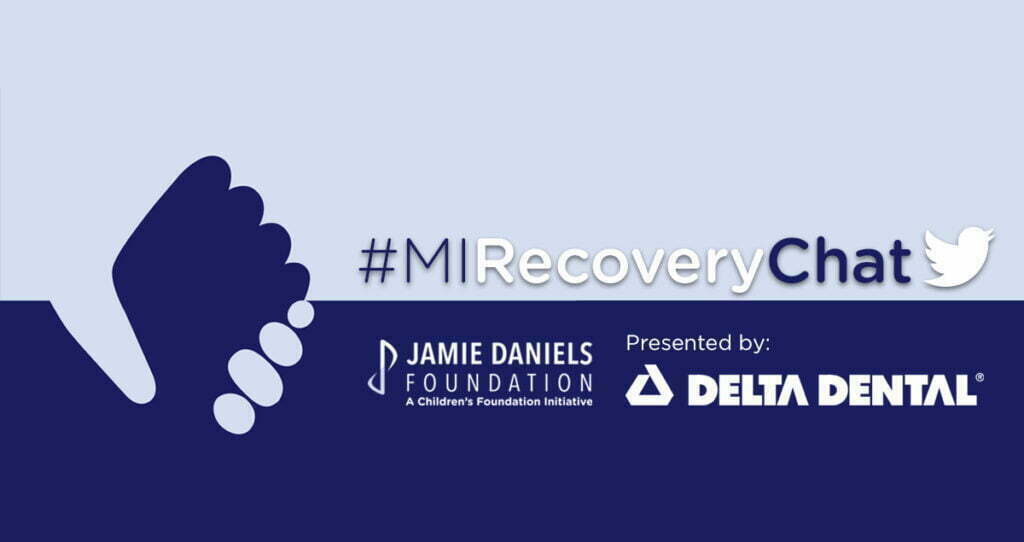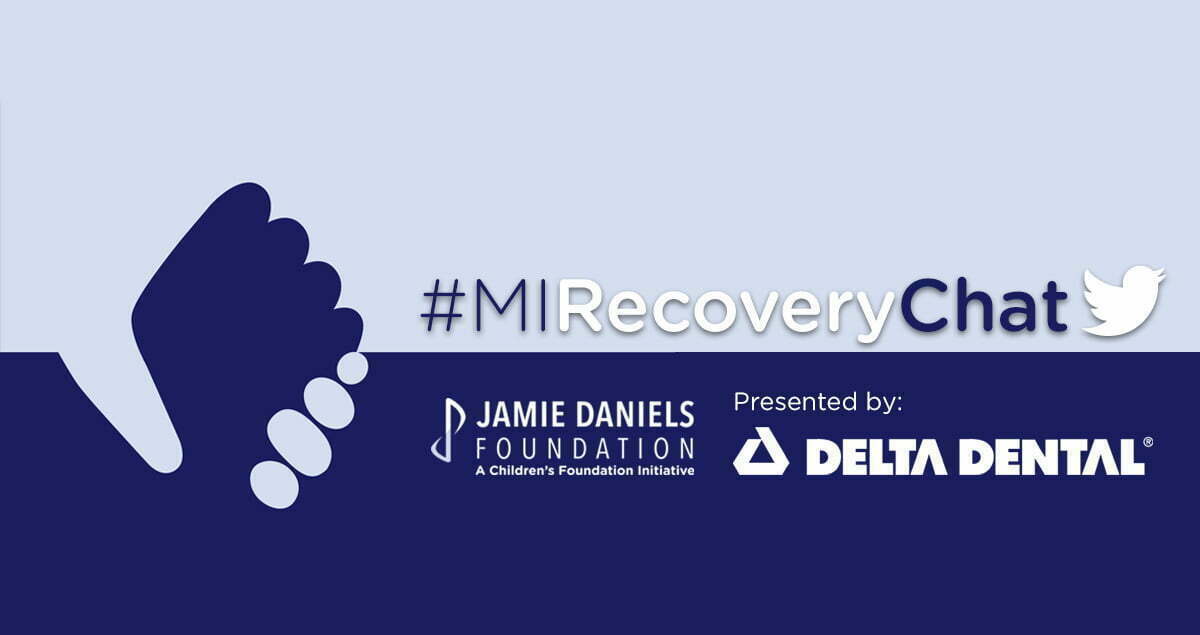
On Thurs., September 24, Jamie Daniels Foundation hosted its first Twitter Chat to bring together organizations and providers to discuss important topics related to Substance Use Disorder, including how it affects individuals, their families and how those impacted can seek help.
Highlights from the conversation are available below; click the question to read all corresponding responses or visit #MIRecoveryChat on Twitter for a complete review.
Thank you to Delta Dental of Michigan for supporting this Twitter Chat. Delta Dental of Michigan is the presenting sponsor for the Jamie Daniels Foundation Celebrity Roast of Scotty Bowman which will take place on October 14 at 8pm on FOX Sports Detroit. For more information, click here.
Question 1: The stigma around Substance Use Disorder (SUD) often prevents families from discussing the topic or taking the steps necessary to treat it. What are common misconceptions about SUD?
- Michigan State University Collegiate Recovery (MSU CRC): The misconception that people with Substance Use Disorder have a stereotyped look or behavior (i.e. homeless, track marks) leads some to deny a SUD diagnosis. Particularly when the culture is supportive of substance use (like in college communities) it can be a barrier to accessing help.
- Leaders Advancing and Helping Communities (LAHC): A big misconception is that talking about substance use introduces it to youth, and this makes families reluctant to bring it up. The reality is that letting people know about substances and the real impacts it has, is more effective in preventing their use!
Question 2: What are signs that a loved one may be struggling with SUD? How can family or friends begin a conversation about recovery?
- Anthony Muller, Samaritas: A well worded question! “Begin a conversation about recovery.” It is often a long-term process. Utilize your relationship to be honest and direct as you share the behaviors you are seeing and your genuine concern. Know your teen, observe and be curious. SUD is incredibly common. Look for changes and trust your gut enough to check things out when things don’t seem right.
- LAHC: Friends & family can begin this conversation by BEING THERE! People suffering with a SUD may feel ashamed/embarrassed because it is such a stigmatized topic. So offering non-judgemental, REAL support is a great first step.
Question 3: The #COVID19 pandemic has created new obstacles for those suffering with SUD. How have #recovery programs adapted to address this environment?
- Susan Styf, CARE of Southeastern Michigan: CARE of Southeastern Michigan began offering programs in smaller group sizes, some programs are on a virtual platform and others are being held outside.
- LAHC: For certain individuals, adapting to a virtual platform may be achievable, but for others it could be really difficult. Having those smaller groups that can abide to pandemic rules are essential to those who thrive in social settings
- MSU CRC: We have encountered this with our students, as well. Our CRC has been providing hybrid online/in-person services to the greatest extent possible for this reason.
Question 4: What obstacles do families face when considering treatment options for SUD? What resources are available to overcome those challenges?
- Anthony Muller, Samaritas: There are obstacles but don’t give up hope. Due to the low numbers of adolescents in treatment (8% of those who need it), there are not always programs available, especially the more intensive programs. If you can’t find help, talk to your pediatrician, insurance company and/or your local Community Mental Health. We are working on an online treatment option for intensive services that could be utilized.
- Susan Styf: A common obstacle is knowing all the options available for treatment. A CARE of Southeastern Michigan peer recovery coach can help navigate the options. This is free to the community.
Question 5: What do you wish everyone could know about substance use disorder?
- Anthony Muller. Samaritas: If you or someone you love is struggling with an SUD you are not alone! Research shows that prevention works, treatment is effective, and people recover!
- MSU CRC: Recovery is one of the hardest things a person can do, involving consistent work & entire life changes. SUD is a chronic brain disease. SUD relapse rate is same as other chronic illnesses (hypertension, asthma) & requires renewed intervention not blame/shame.




